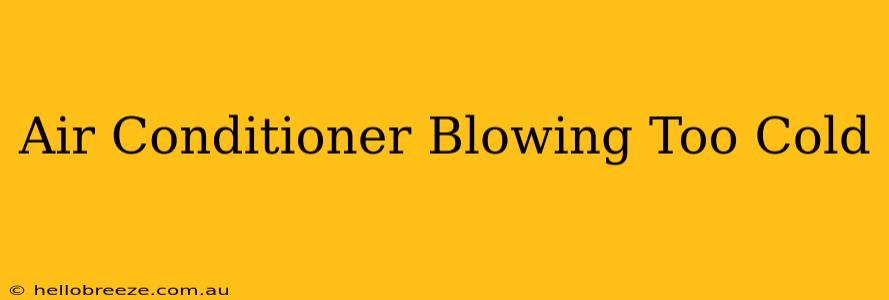Is your air conditioner blasting arctic air, leaving you shivering instead of comfortable? A too-cold AC unit isn't just uncomfortable; it can also be inefficient and potentially damaging to your system. This comprehensive guide will help you diagnose the problem and find solutions to restore a pleasant and energy-efficient home environment.
Understanding Your AC System: Why is it Too Cold?
Before diving into solutions, let's understand why your AC might be blowing excessively cold air. Several factors can contribute to this issue:
-
Incorrect Thermostat Settings: The most common culprit! Double-check your thermostat's settings. Ensure the temperature is set appropriately for your comfort level and that the fan mode is correctly selected (Auto, On, etc.). A malfunctioning thermostat can also cause this problem.
-
Restricted Airflow: Obstructed air vents, dirty air filters, or clogged vents can restrict airflow, forcing your AC to work harder and blow colder air to compensate. Regular maintenance is crucial here.
-
Refrigerant Issues: An overcharge of refrigerant can lead to excessively cold air. This requires professional attention, as improper refrigerant levels can damage your system.
-
Faulty Blower Motor: A malfunctioning blower motor might be running at a higher speed than intended, resulting in colder airflow.
-
Problems with the Evaporator Coil: A frozen or iced-up evaporator coil can also cause your AC to blow colder air. This often indicates a different underlying issue, such as low refrigerant or restricted airflow.
Troubleshooting Steps: Finding the Cause
Let's tackle troubleshooting step-by-step:
1. Check the Thermostat:
- Verify Temperature Setting: Is the thermostat set too low? Adjust it to a comfortable temperature and monitor the airflow.
- Inspect for Malfunctions: Look for any obvious damage, loose wires, or erratic behavior. Consider replacing the thermostat if necessary. A simple battery replacement might solve the problem in some cases.
2. Inspect Airflow:
- Clean or Replace Air Filters: Dirty air filters drastically restrict airflow. Check and replace your filters regularly (typically every 1-3 months).
- Check Vents: Make sure all supply and return air vents are open and unobstructed. Remove any furniture or objects blocking airflow. Clean the vents to ensure optimal air passage.
3. Listen to the Unit:
- Unusual Noises: Listen for unusual noises coming from your AC unit. Strange sounds can indicate a problem with the compressor, blower motor, or other components.
When to Call an HVAC Technician:
While many issues can be resolved independently, some problems require the expertise of a qualified HVAC technician. Call a professional if:
- You suspect a refrigerant problem. Improper refrigerant levels are dangerous and require specialized tools and knowledge to address.
- You hear unusual noises or notice strange behaviors. This might signal a more significant mechanical issue within your AC unit.
- Your troubleshooting attempts are unsuccessful. After checking the thermostat, airflow, and filters, and the problem persists, it's time to seek professional assistance.
Preventing Excessively Cold Air: Regular Maintenance
Regular maintenance is key to preventing issues like excessively cold AC air:
- Change air filters regularly: This single act prevents many problems.
- Schedule annual AC tune-ups: A professional inspection identifies and addresses minor problems before they escalate into major issues.
- Keep vents clean and unobstructed: Regular cleaning prevents airflow restrictions.
By following these troubleshooting steps and prioritizing regular maintenance, you can keep your AC unit running efficiently and comfortably, avoiding the unpleasant chill of excessively cold air. Remember, tackling this problem quickly can save you money on energy bills and prevent costly repairs down the road.

